The Picture of Dorian Gray
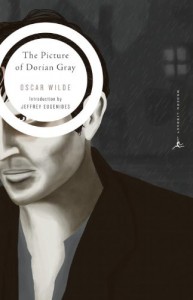 The Picture of Dorian Gray is a classic story that after reading it, it is more of a good idea rather than a good book. Dorian Gray is the ultimate narcissist, so much so that he makes a Faustian pact for him to be young and beautiful forever after he receives a portrait from his artist friend Basil Hallward. While his looks remain unchanged, the portrait becomes old and corrupted as he does terrible things in his life, starting with driving his fiancée to commit suicide after breaking up with her because of a poor performance on stage.
The Picture of Dorian Gray is a classic story that after reading it, it is more of a good idea rather than a good book. Dorian Gray is the ultimate narcissist, so much so that he makes a Faustian pact for him to be young and beautiful forever after he receives a portrait from his artist friend Basil Hallward. While his looks remain unchanged, the portrait becomes old and corrupted as he does terrible things in his life, starting with driving his fiancée to commit suicide after breaking up with her because of a poor performance on stage.As I mentioned, it’s a cool idea but not a particularly good book. For one thing, there isn’t a single likeable character in the whole book. Dorian is agonizingly weak and shallow. Basil is soft and wishy-washy. His friend, Henry, is utterly amoral. When a peasant character dies, he’s not concerned about the man’s life but only that the man who killed him in a hunting accident will be considered a bad shot. The characters are thoroughly misogynistic and prejudiced. The novel is filled with long, painful conversations that seem to go nowhere and get old real quick. By the time I got to the end of the novel, I was glad that it was done.
Carl Alves – author of Blood Street
Blaze of Glory
 Weston Ochse offers up a new kind of apocalypse in Blaze of Glory. Unlike the usual zombies or natural disaster, the downfall of humanity is the result of little critters that resemble maggots, along with their cousins that are the size of Cadillacs and destroy everything in their path. The little guys burrow into people and multiply, eventually killing their human host. Their weakness? Salt. It’s a good thing we have oceans, something that our survivors, located in North Carolina, come to realize just might be the path of their salvation. Buckley and the others are holed up in a restaurant, but realize they are facing a losing battle against the maggots. This leads to a mad dash to the nearby ocean, which seems like a million miles away as they have to get through both the little and the big critters.
Weston Ochse offers up a new kind of apocalypse in Blaze of Glory. Unlike the usual zombies or natural disaster, the downfall of humanity is the result of little critters that resemble maggots, along with their cousins that are the size of Cadillacs and destroy everything in their path. The little guys burrow into people and multiply, eventually killing their human host. Their weakness? Salt. It’s a good thing we have oceans, something that our survivors, located in North Carolina, come to realize just might be the path of their salvation. Buckley and the others are holed up in a restaurant, but realize they are facing a losing battle against the maggots. This leads to a mad dash to the nearby ocean, which seems like a million miles away as they have to get through both the little and the big critters.Blaze of Glory is a fun, fast-paced novel. The grim scenario is painted out well and the atmosphere created really fits the story. Although I have a general fatigue with end of the world type novels, since I seem to be reading many of them lately, this was a different type of disaster and a more localized scenario without an extensive story about the survival of a group, and instead fixating on accomplishing one singular goal. I liked the focus of the novel. The characters were a bit rough around the edges and not always likeable, but remained intent on accomplishing their goals. This was an enjoyable novel that I would recommend reading.
Carl Alves - author of Reconquest: Mother Earth
The Laws of Murder: A Charles Lenox Mystery
 The novel is set in London in 1876, a popular time to set a story in. Charles Lenox has quit his job in Parliament to start a private detective agency, the first of its kind. As the agency is going through growing pains, two related murders happen, one to a friend in Scotland Yard and another to a lord with a shady past. Despite obstacles in their course, namely the threat of physical violence against his family, Lenox analytically pursues the case trying to figure out how the convent across the street from a murder scene and luggage ticket on a ship tie everything together.
The novel is set in London in 1876, a popular time to set a story in. Charles Lenox has quit his job in Parliament to start a private detective agency, the first of its kind. As the agency is going through growing pains, two related murders happen, one to a friend in Scotland Yard and another to a lord with a shady past. Despite obstacles in their course, namely the threat of physical violence against his family, Lenox analytically pursues the case trying to figure out how the convent across the street from a murder scene and luggage ticket on a ship tie everything together.This was an enjoyable mystery in many ways. Lenox has a likeable personality and displays some sharp analysis. He comes off as being very British, a man of high birth, belonging to the upper class, but still willing to get his hands dirty and do some work. The story unfolded with tension and drama. Besides the mystery component, there are personal sub-plots at work involving the start and survival of the detective agency that Lenox and friends start. The murderer in the novel is a bit cliché but the ultimate motive for the murders was interesting.
Carl Alves – author of Blood Street
Still Life
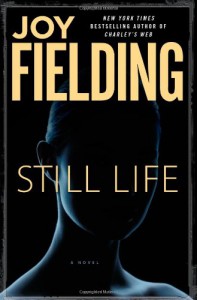 In Still Life, Casey Marshall has everything going for her—looks, money, a great marriage, a successful business—that is until she is hit by a car and goes into a coma. The book is all through Casey’s perspective, which means that it all takes place in her hospital room or later the room in her house after she transfers. The book mostly consists of conversations of her family and friends, which made for a slow pace in the novel. It becomes clear fairly early on that someone tried to kill Casey, so there wasn’t a whole lot of suspense when the killer is revealed very early on in the novel.
In Still Life, Casey Marshall has everything going for her—looks, money, a great marriage, a successful business—that is until she is hit by a car and goes into a coma. The book is all through Casey’s perspective, which means that it all takes place in her hospital room or later the room in her house after she transfers. The book mostly consists of conversations of her family and friends, which made for a slow pace in the novel. It becomes clear fairly early on that someone tried to kill Casey, so there wasn’t a whole lot of suspense when the killer is revealed very early on in the novel.This novel was pretty awful for the most part. Since the novel takes place in Casey’s perspective, the book drowns in inane conversations with poorly written characters. Casey’s internal dialogue is nothing but annoying. The novel uses a dreadful amount of flashback—way too much for my liking. It’s limited because of the way the story is told. In addition, the husband is revealed very early on as the one who plotted to kill Casey. He’s presented as a highly intelligent lawyer who has been able to convince people that he’s this great person. Then ridiculously enough he has conversations which give him away as the killer right in front of Casey, even though it is revealed that she can hear what they are saying. So this intelligent person is talking about how he plotted to kill his wife right in front of her? How ridiculous. Having said all of that, the final third of the novel is actually pretty good. There was sufficient tension and drama, which saves it from being a bad novel.
Carl Alves – author of Blood Street
Duma Key
 I want to start off by writing that Stephen King is my all-time favorite author, but his recent work leaves a lot to be desired. Unfortunately, The Duma Key falls into the latter category of disappointing novels. The story starts with Edgar Freemantle, a successful contractor whose truck collides with a crane on a job site. He loses an arm and fractures his skull in the accident. He makes good progress on his rehab but suffers bouts of rage, which ends his marriage. On the advice of his psychiatrist, he moves to the Florida Keys. Freemantle starts to work on art, which has strange mystical power. This leads to a confrontation with the malevolent force that exists in Duma Key.
I want to start off by writing that Stephen King is my all-time favorite author, but his recent work leaves a lot to be desired. Unfortunately, The Duma Key falls into the latter category of disappointing novels. The story starts with Edgar Freemantle, a successful contractor whose truck collides with a crane on a job site. He loses an arm and fractures his skull in the accident. He makes good progress on his rehab but suffers bouts of rage, which ends his marriage. On the advice of his psychiatrist, he moves to the Florida Keys. Freemantle starts to work on art, which has strange mystical power. This leads to a confrontation with the malevolent force that exists in Duma Key.There is a lot that I don’t like about this novel, and little that I do like. For one thing, it is a very slow paced novel. Stephen King could easily have cut a third out of this book and not have lost anything. The characters were never ones I could identify with and weren’t very likeable. The plot isn’t very believable, even if you are willing to accept the supernatural elements. The ending was weak, and I was glad to finally be done reading this book. Even for the hard core Stephen King fan, this is one to skip.
Carl Alves – author of Blood Street
Dracula: The Undead
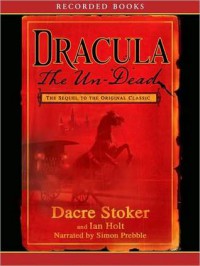 I’m always a little wary when people try to mess with a classic, even moreso when the novel is a direct sequel to it. However, the fact that it is written by Bram Stoker’s great-grandnephew and a Dracula historian lend it a great deal of credibility. The novel is set in 1912, a quarter of a century after Van Helsing and his “band of heroes” defeated Dracula. Front and center in this novel is Quincey Harker, the son of Mina and Jonathan Harker. His parents have kept him in the dark regarding their family history as it pertains to Dracula. When members of the band of heroes start to die off, Mina, who has not aged in the past twenty-five years, realizes that she has to reveal the family history to her son, who has turned away from the career of a lawyer that his father has plotted for him and aspires to be an actor under the tutelage of the great Basarab (who isn’t exactly who he seems to be). The true villain in the novel is revealed not to be Dracula but Countess Bathory, a sixteenth century vampire related to Dracula who is wreaking her revenge on God and humanity. Jonathan and the remaining heroes must once again face the evil that exists, but don’t necessarily know who the villains are.
I’m always a little wary when people try to mess with a classic, even moreso when the novel is a direct sequel to it. However, the fact that it is written by Bram Stoker’s great-grandnephew and a Dracula historian lend it a great deal of credibility. The novel is set in 1912, a quarter of a century after Van Helsing and his “band of heroes” defeated Dracula. Front and center in this novel is Quincey Harker, the son of Mina and Jonathan Harker. His parents have kept him in the dark regarding their family history as it pertains to Dracula. When members of the band of heroes start to die off, Mina, who has not aged in the past twenty-five years, realizes that she has to reveal the family history to her son, who has turned away from the career of a lawyer that his father has plotted for him and aspires to be an actor under the tutelage of the great Basarab (who isn’t exactly who he seems to be). The true villain in the novel is revealed not to be Dracula but Countess Bathory, a sixteenth century vampire related to Dracula who is wreaking her revenge on God and humanity. Jonathan and the remaining heroes must once again face the evil that exists, but don’t necessarily know who the villains are.This was a really enjoyable novel in a lot of ways. It helped that the characters were familiar, with the exception of Jonathan. The novel is exceptionally well-written and professional. There is a logical flow to the progression from the original novel to the sequel. The plot itself was very strong. Having said that, I found a couple of the things that were implemented in here a bit jarring, such as the appearance of Bram Stoker as a character (although this was sufficiently explained) and the transformation of Van Helsing’s character. I liked the inclusion of real-life historical figures into the novel and how they incorporated events like the Jack the Ripper murders into the story. The part with the Titanic at the end was a bit much for me, but for the most part this was well-handled. This novel was definitely a worthy successor to the original, one that I’m sure Bram Stoker would be proud of.
Carl Alves - author of Blood Street
Appaloosa
 Appaloosa is one of the best Western novels that I have read, and Robert Parker’s finest novel. The two principal characters, Virgil Cole and his deputy, Everett Hitch, who narrates the story, are two very well-rounded and likeable characters. Part of the reason that the novel really works is the presence of these two characters. In this story, Cole and Hitch arrive in a new town where the resident bad guy, Randall Bragg, killed the previous marshal and deputy. After they arrest Bragg, he is tried and sentenced to be hanged. This leads up to a climactic gun fight where hired guns are trying to free Bragg. Meanwhile Cole falls for a high maintenance woman that Hitch knows is no good for him. When Bragg returns to town this sets up for a climactic and surprise ending.
Appaloosa is one of the best Western novels that I have read, and Robert Parker’s finest novel. The two principal characters, Virgil Cole and his deputy, Everett Hitch, who narrates the story, are two very well-rounded and likeable characters. Part of the reason that the novel really works is the presence of these two characters. In this story, Cole and Hitch arrive in a new town where the resident bad guy, Randall Bragg, killed the previous marshal and deputy. After they arrest Bragg, he is tried and sentenced to be hanged. This leads up to a climactic gun fight where hired guns are trying to free Bragg. Meanwhile Cole falls for a high maintenance woman that Hitch knows is no good for him. When Bragg returns to town this sets up for a climactic and surprise ending.There are many things that make Apaloosa work, but what I liked most is the easy going narration style that really complements the mood and content of the novel. The prose is written professionally with few flaws. This is a quickly paced novel packed with plenty of action. Even if you are like me and don’t typically read Westerns, this one is well worth reading.
Carl Alves – author of Blood Street
The Bone Vault
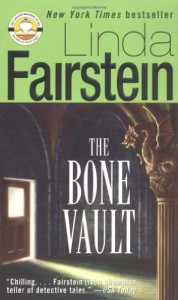 The setting for the murder that is at the center of The Bone Vault takes place at the Metropolitan Museum of Art. Alexandra Cooper is investigating the murder of a woman who used to work there. She was working on a modern bestiary that was a joint venture between the Met and American Museum of Natural History. Cooper finds the murder victim in a sarcophagus intended for an Egyptian princess. Setting plays a key role in this novel as much of the investigation takes place at the respective museums as the investigation reveals that the victim was involved in bringing back old remains to the land in which it originated.
The setting for the murder that is at the center of The Bone Vault takes place at the Metropolitan Museum of Art. Alexandra Cooper is investigating the murder of a woman who used to work there. She was working on a modern bestiary that was a joint venture between the Met and American Museum of Natural History. Cooper finds the murder victim in a sarcophagus intended for an Egyptian princess. Setting plays a key role in this novel as much of the investigation takes place at the respective museums as the investigation reveals that the victim was involved in bringing back old remains to the land in which it originated.I feel mostly ambivalent about this novel. The setting definitely adds to the novel. It’s a mixture of high culture, high society, and big-game hunters. It was not the typical scene for a murder mystery. Much of the plot is convoluted and kind of meanders. The killer is not set up very well. When the reveal happens, I didn’t have a reaction that was “oh, that makes sense.” It was more like, “Really?” In the end, this wasn’t a bad novel, it was more of a mediocre one. There was nothing exceptional about it, but it was a solid read.
Carl Alves – author of Blood Street
Feed
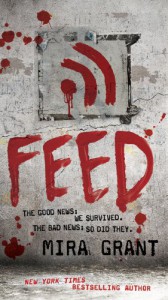 Feed takes place in the year 2039, 25 years after the zombie outbreak that occurred in 2014. In this novel, the characters are not facing a full on apocalypse. Despite the presence of zombies, much of society is intact. There are fully-operating restaurants, blogs, and even a presidential campaign. Georgia and Shaun Mason are a brother and sister duo who run a blog and have been chosen to cover the presidential campaign of Senator Ryman. Georgia is a straight news reporter while Shaun does crazy stunts to provoke the zombies. While on the campaign trail, someone is trying to make sure that they don’t make it out alive, starting by creating a zombie outbreak at a campaign stop in Oklahoma, and then later at the Senator’s ranch in Wisconsin. Meanwhile Georgia and Shaun are on the verge of uncovering a conspiracy, which makes them the target of these attacks.
Feed takes place in the year 2039, 25 years after the zombie outbreak that occurred in 2014. In this novel, the characters are not facing a full on apocalypse. Despite the presence of zombies, much of society is intact. There are fully-operating restaurants, blogs, and even a presidential campaign. Georgia and Shaun Mason are a brother and sister duo who run a blog and have been chosen to cover the presidential campaign of Senator Ryman. Georgia is a straight news reporter while Shaun does crazy stunts to provoke the zombies. While on the campaign trail, someone is trying to make sure that they don’t make it out alive, starting by creating a zombie outbreak at a campaign stop in Oklahoma, and then later at the Senator’s ranch in Wisconsin. Meanwhile Georgia and Shaun are on the verge of uncovering a conspiracy, which makes them the target of these attacks.Feed was a very enjoyable novel in many ways. With so many zombie novels and shows out there, this one stood above the pack. For one thing, the world created here isn’t fully apocalyptic, which is an interesting change of pace. I liked the level of detail put into how the Mason’s blog operates, along with many of the rules created. In general, the world building in this novel is thought provoking. The characters are multi-dimensional and interesting. The action has a slow build to it, heating up by the end of the novel. The one criticism that I have is that the big conspiracy suffers from believability issues and could be explained better. This is a cool novel; one you’ll want to check out.
Carl Alves - author of Reconquest: Mother Earth
The Good Guy
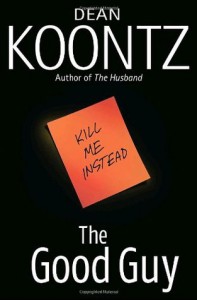 Every time I read a Dean Koontz novel I keep hoping that I am going to read one of his great novels that he is certainly capable of putting together. Invariably, I’m disappointed. There were so many flaws in The Good Guy that I’m not even sure where to start. First off, the premise may be interesting, but it’s not remotely plausible. If two men were making a deal to assassinate some women, they would have to know who each other is before commencing with the deal. The guy paying to assassinate the woman isn’t going to go up to a random guy in a bar and hand him ten thousand dollars without being one hundred percent sure he’s dealing with the hired assassin. Second, assassins are professional. They kill people to earn income. This assassin was solely in it for principal of having another person killed. Koontz is the worst writer I’ve ever read when it comes to antagonists. They have no resemblance to actual human beings, and this antagonist is no exception to that rule.
Every time I read a Dean Koontz novel I keep hoping that I am going to read one of his great novels that he is certainly capable of putting together. Invariably, I’m disappointed. There were so many flaws in The Good Guy that I’m not even sure where to start. First off, the premise may be interesting, but it’s not remotely plausible. If two men were making a deal to assassinate some women, they would have to know who each other is before commencing with the deal. The guy paying to assassinate the woman isn’t going to go up to a random guy in a bar and hand him ten thousand dollars without being one hundred percent sure he’s dealing with the hired assassin. Second, assassins are professional. They kill people to earn income. This assassin was solely in it for principal of having another person killed. Koontz is the worst writer I’ve ever read when it comes to antagonists. They have no resemblance to actual human beings, and this antagonist is no exception to that rule.To make matters worse, Koontz employs the shadowy organization comprised of rich and powerful men who are virtually omnipotent and control things unbeknownst to the rest of society. This is probably the absolute most cliché thing in fictional novels and movies. It’s bad enough that Koontz has this horrible antagonist, but then he has to bring an even worse group of bad guys into the fray. The action is not remotely believable. The characters are thin and cliché. I can’t really say that there is a whole lot redeemable about this novel and I would advise readers to stay away from this one.
Carl Alves - author of Blood Street
The Home
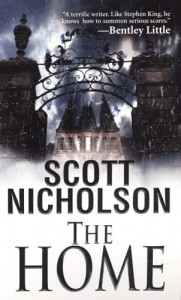 In The Home, Freeman Mills is a twelve-year-old rebellious type who has gone through various homes until he reaches Wendover, a home for troubled children. After having gone through traumatic experiences as a child, his plan is to lay low, a task that isn’t so easy for someone with the ability to read minds, and as he soon learns, to see ghosts. Wendover is really a front for bizarre experimentation being funded by some shadowy government agency, that never got explained very well in the novel and had a bit of a cliché feel to it. At Wendover, they bring the children to a state of death briefly before bringing them back. This experimentation unleashes many of the ghosts at the site that once used to be a mental institution.
In The Home, Freeman Mills is a twelve-year-old rebellious type who has gone through various homes until he reaches Wendover, a home for troubled children. After having gone through traumatic experiences as a child, his plan is to lay low, a task that isn’t so easy for someone with the ability to read minds, and as he soon learns, to see ghosts. Wendover is really a front for bizarre experimentation being funded by some shadowy government agency, that never got explained very well in the novel and had a bit of a cliché feel to it. At Wendover, they bring the children to a state of death briefly before bringing them back. This experimentation unleashes many of the ghosts at the site that once used to be a mental institution.The Home was an enjoyable novel. There was a great deal of suspense and intrigue as the devious nature of Wendover and the people who ran it were slowly unveiled. There was also the specter of what had happened to Freeman as a child, which ties into what was currently happening, that I also found intriguing. The setting of the story worked well to set up the mood and atmosphere. There were a few things that happened in the later part of the novel that I found a bit confusing and not well-explained, but the ending itself was satisfying. This was a good horror story that I would recommend.
Carl Alves - author of Blood Street
The Woods
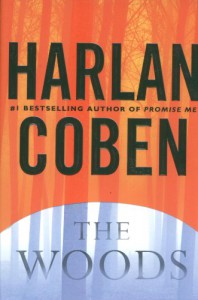 The action and events that take place in The Woods are triggered by an event that happened twenty years previously. Paul Copeland, now a prosecutor in New Jersey, was in the woods and was supposed to be patrolling the summer camp where he worked. That night, two counselors died, and his sister and another boy disappeared, never to be seen again until the boy who disappeared shows up twenty years later murdered. This leads Paul to think that his sister might still be alive since her body was never found. While this is going on, Paul is embroiled in prosecuting a rape case of two wealthy frat brothers, whose fathers are willing to destroy Paul’s life and those around him in order for him to back off the case. Meanwhile, Paul rekindles the romance he had with his girlfriend all those years ago at camp.
The action and events that take place in The Woods are triggered by an event that happened twenty years previously. Paul Copeland, now a prosecutor in New Jersey, was in the woods and was supposed to be patrolling the summer camp where he worked. That night, two counselors died, and his sister and another boy disappeared, never to be seen again until the boy who disappeared shows up twenty years later murdered. This leads Paul to think that his sister might still be alive since her body was never found. While this is going on, Paul is embroiled in prosecuting a rape case of two wealthy frat brothers, whose fathers are willing to destroy Paul’s life and those around him in order for him to back off the case. Meanwhile, Paul rekindles the romance he had with his girlfriend all those years ago at camp.This novel is a bit of a mixed bag. There is a lot of suspense and drama. I found myself compelled to go forward and continue reading to find out what really happened in those woods. I also found the writing to be very competent and professional. Paul is a good character, a man of high integrity who is haunted by his past. An interesting theme in this novel is the depths that parents are willing to go to in order to protect their children, something that was pervasive throughout the novel. There were two things I didn’t like about the novel. The first is that when the reveal was finally made, it was a bit convoluted and hard to believe. The second is that there were multiple people who committed murders in this novel—too many for my liking. I think it’s hard for a person to kill another person, and it came too easily in this novel.
Carl Alves – author of Blood Street
The Race
 The Race is poorly written, not very believable, trite, and annoying to read. There was little to no credibility or positive aspects about this novel. What makes it worse was that the author clearly had a political agenda in this novel. The level of bias interfered with any possibile enjoyment. I don’t read fiction to hear about an author’s political beliefs, but Richard North Patterson clearly used this as a soapbox for him to espouse his own theories.
The Race is poorly written, not very believable, trite, and annoying to read. There was little to no credibility or positive aspects about this novel. What makes it worse was that the author clearly had a political agenda in this novel. The level of bias interfered with any possibile enjoyment. I don’t read fiction to hear about an author’s political beliefs, but Richard North Patterson clearly used this as a soapbox for him to espouse his own theories.In this novel, Senator Corey Grace, a Republican from Ohio, who is a Gulf War hero, is in line to get the party’s nomination for the upcoming presidential race. He is opposed by some of the people pulling strings within the party. The race changes when he enters a relationship with Lexie Hart, an African American actress lobbying for stem cell research.
There is so much wrong with this novel and just about nothing right. For one thing, stem cell research is the biggest issue in the campaign, when in real life it ranks about 100th in terms of political priorities. Secondly, the characters are characaturish cartoons instead of real people. The political axe-grinding by the author is nauseating. There is nothing remotely believable about any aspect of this novel. This is one of the worst novels I have read. Don’t waste your time with it.
Carl Alves – author of Blood Street
The Lost World
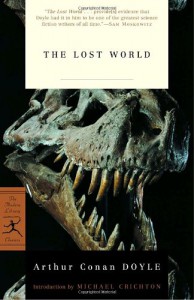 The Lost World is a science fiction novel without much actual science to it, which shouldn’t be that surprising considering that it was written by one of the time’s premier mystery writers. It’s really more an adventure tale than anything, and has quite a bit of interesting elements to it. A group of Englishmen travel to uncharted territory to an area from a bygone era. They travel to South America to find a land that has not only dinosaurs but also a race of prehistoric man. The group included the intrepid reporter looking for adventure, the skeptical professor, the professor who takes life by the horns in hopes of new discovery, and a British lord who is your basic big game hunter type.
The Lost World is a science fiction novel without much actual science to it, which shouldn’t be that surprising considering that it was written by one of the time’s premier mystery writers. It’s really more an adventure tale than anything, and has quite a bit of interesting elements to it. A group of Englishmen travel to uncharted territory to an area from a bygone era. They travel to South America to find a land that has not only dinosaurs but also a race of prehistoric man. The group included the intrepid reporter looking for adventure, the skeptical professor, the professor who takes life by the horns in hopes of new discovery, and a British lord who is your basic big game hunter type.There were a lot of aspects that I like about this novel, mostly the characters and the adventure portion of it. It had a real trailblazing feel to it, which I’m sure worked well for the time in which it was written. On the down side, there were some latent racism in the way Doyle handles the “negroes” and natives to the land, even the prehistoric men. There was also a distinct lack of female characters in the novel, which could have added something to it. I also felt that the writing kept the reader at a distance rather than involving them in the action. All together, this novel was enjoyable but not one that resonates.
Carl Alves – author of Two For Eternity
Bloodroom
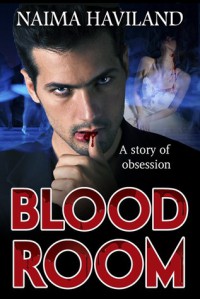 In Bloodroom, Julian Mouret is a powerful vampire who is required by the laws that bind vampires to kill Natalie, a ballerina, because she saw his true vampiric nature. The only problem is that Julian has fallen madly in love with Natalie. Even though he knows what he must do, he can’t get himself to kill his beloved as they start to develop a physical relationship. Meanwhile, as Natalie’s memory of the events leading up to this situation start to clarify, she starts to suspect something isn’t quite right with Julian. To make matters worse, one of her ballet partners is being visited/attacked by one of the vampires in Julian’s brood, and another goes missing.
In Bloodroom, Julian Mouret is a powerful vampire who is required by the laws that bind vampires to kill Natalie, a ballerina, because she saw his true vampiric nature. The only problem is that Julian has fallen madly in love with Natalie. Even though he knows what he must do, he can’t get himself to kill his beloved as they start to develop a physical relationship. Meanwhile, as Natalie’s memory of the events leading up to this situation start to clarify, she starts to suspect something isn’t quite right with Julian. To make matters worse, one of her ballet partners is being visited/attacked by one of the vampires in Julian’s brood, and another goes missing.Bloodroom presents some interesting elements in vampiric lore. One of them is the room that gives this novel its title, which is a room of people being cocooned by spiders, which allow the vampires to feed upon them. It was an interesting concept that I had not seen before. I’m not sure that the logistics would completely work in terms of secrecy and other aspects, but I applaud the author’s originality. Setting plays a big part in this novel, and I think the author really incorporates the setting well, creating atmosphere and soaking it into the fabric of the story. The characters were compelling. The parts that I thought could have used some work is that beyond the relationship between Julian and Natalie, the plot is a little thin, and the chase between the two main characters got a bit repetitive in spots. Otherwise, this was an enjoyable vampire novel that fans of paranormal romance will enjoy.
Carl Alves - author of Blood Street




